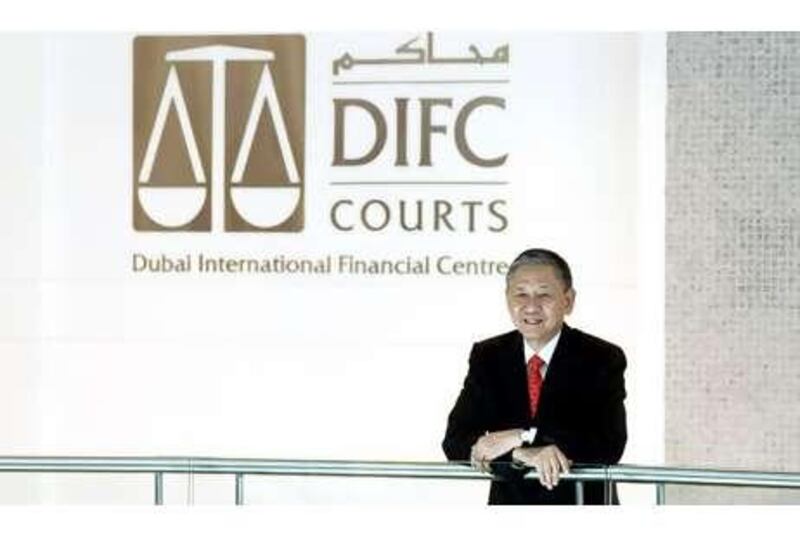Michael Hwang, a veteran of the Singapore legal system, has become only the second chief justice of the Dubai International Financial Centre (DIFC) Courts. Mr Hwang inherits responsibility for one of the fastest-growing legal centres in the region. Since its inception in 2004, the DIFC Courts have seen the number of cases filed in their jurisdiction increase significantly. Now, the challenge is to steer the courts towards a broader role in the DIFC and the Gulf region as a whole.
"The job now is to improve on the building blocks," Mr Hwang said. The DIFC Courts saw 36 cases last year compared with eight in 2008. And the Dubai Government is considering an expansion of the courts' jurisdiction, which is currently restricted to the DIFC, to include disputes in the wider region. "In the longer term it may be possible to offer this neutral court for the resolution of other regional disputes," Mr Hwang said.
The DIFC London Court of International Arbitration can handle cases from around the world. Sir Anthony Evans, the departing chief justice of the DIFC Courts, will remain as the chairman of the Dubai World Tribunal. Sheikh Mohammed bin Rashid, Vice President of the UAE and Ruler of Dubai, set up the tribunal last year with a special law to handle disputes related to Dubai World, which is restructuring US$23.5 billion (Dh86.29bn) of debt.
For now, the focus is on increasing the reach of the Small Claims Tribunal, created last year to handle disputes involving claims up to Dh100,000. The courts have called for that to be raised to Dh500,000. Mr Hwang said he would like the tribunal to be allowed to hear any employment dispute in the DIFC. "These are some of the most meaningful cases because they often involve employees not being paid, which has a big impact on people's lives," he said.
Of the cases filed in the Small Claims Tribunal, about 95 per cent are resolved by mediation rather than drawn-out litigation. Mr Hwang will not be based in Dubai but will travel from Singapore to preside over cases and handle the courts' administration. Mark Beer, the registrar and who Mr Hwang calls the "CEO" of the courts, is in charge of day-to-day activities. Five of the seven judges in the DIFC Courts are not based in Dubai but are on rotating shifts.
Mr Hwang is a senior counsel to the Singapore supreme court and an independent barrister. He was a judicial commissioner and on the UN compensation commission assessing claims against Iraq after the First Gulf War. Many of the changes under way at the DIFC courts have to do with streamlining, including the launch of a digital system that allows parties in a case and members of the public to monitor the progress of cases online, - an innovation that is new to the Emirates.
For Mr Hwang, the changes relate to the core mission of the DIFC Courts to bring "speed, efficiency and proportionate justice" to its handling of cases. "The job is not done yet," he said. @Email:bhope@thenational.ae





